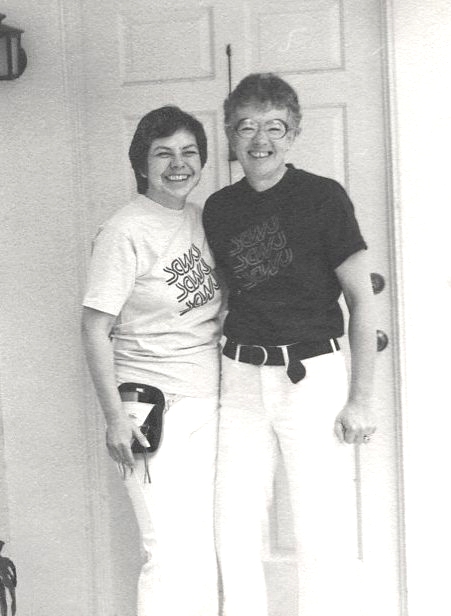A Letter From Lillian Faderman
The lesbian world that I first came into, here in Los Angeles almost forty years ago, seemed to me to exist only in darkness. Our world seemed to have been invented in that moment of time. We had no past — or, if we did, no one knew or could tell me about it. Because we had no knowledge of those who came before us, our isolation and loneliness felt tragic and inevitable. It is no wonder that the few books that were written had sad titles such as We Walk Alone or Odd Girl Out.
Twenty years later, in the 1970s, the lesbian world began to change. We realized, as we dreamt of the Lesbian Nation, that we could and must make our lesbian communities strong. Part of our struggle was to fight the erasure that had always been used to keep us weak. We had to proclaim not only our immediate presence but the fact that many went before us, that we did indeed have a history. It was in this climate that The June L. Mazer Lesbian Archives was created.
The Archives, originally called the West Coast Lesbian Collections, was founded in Oakland California, in1981. Six years later it was moved to Los Angeles by Connexxus Women’s Center/Centro de Mujeres. The Archives acquired its present name after the death of June Mazer, in honor of her work as a community activist and invaluable supporter of the Archives.
The June L. Mazer Lesbian Archives remains the only archive on this side of the continent that is dedicated exclusively to preserving lesbian history and to guaranteeing that those who come after us will not have to believe that they “walk alone.” The Archives is committed to gathering and preserving materials by and about lesbians and feminists of all classes, ethnicities, races and experiences. Included are personal letters and scrapbooks, artwork, manuscripts, books, records, newspapers, magazines, photographs, videotapes, flyers, papers of lesbian and feminist organizations, private papers, and even clothing, such as softball uniforms from the 1940s and 50s.
Hundreds of lesbians and feminists have been inspired to donate artifacts of their personal and collective histories. The Archives encourages all lesbians to deposit the everyday mementos of your lives so that others can discover them in the future. The privacy of any donor is protected to whatever extent she desires.
In 1989, the archives earned 501(c)(3) nonprofit status and received donated space from the City of West Hollywood, where it remains today.
The all-volunteer staff of the Mazer Archives not only keeps the doors open, but also helps to make lesbian communities and others aware of our history through speaking engagements, the Archives’ newsletter, In The Life, (no longer in publication), and special programs and exhibits.




